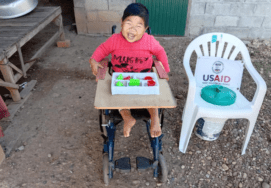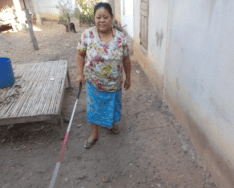Removing Barriers for Girls and Women to Access Healthcare and Assistive Products
July 25th, 2022 | Stories
Mim practices walking with her new limb orthopedic. Photo by ARMI CBID Facilitator.
My daughter has had difficulties in mobility since birth. I take care of her daily. I don’t know where to go and what to do about her health condition, but when the health professionals and CBID team came and arranged the referral, I learned more about rehabilitation and assistive products. Mim has now received her first lower limb orthotic to help her walk.” – Mim’s mother
Mim was born with Cerebral Palsy, a health condition that makes her unable to walk independently. Mim’s mother—her main caregiver—was stressed about her lack of information about Cerebral Palsy and knowledge of how to best support her daughter. She did not know that Mim would benefit from rehabilitation. As a result, Mim did not receive timely rehabilitation and her ability to function in everyday life gradually worsened.
When Mim’s mother was introduced to the USAID Okard project Community-Based Inclusive Development (CBID) team, she started to learn about Mim’s health condition and the benefits of rehabilitation. Working together with authorities from the local Labour and Social Welfare and Health offices, World Education’s CBID team identified Mim’s needs and referred her to a health professional at the Provincial Rehabilitation Center. During their first visit to the center she was assessed and measured for a lower limb orthotic to help her walk. The health professional provided important information to Mim’s mother about how to support her daughter and help to improve her abilities in everyday life. Mim and her mother now are being closely monitored by the health professional to ensure Mim continues to improve. Her mother too feels supported and confident in caring for her daughter.
 Leuakham received her wheelchair with an additional table part. Photo by ARMI CBID Facilitator.
Leuakham received her wheelchair with an additional table part. Photo by ARMI CBID Facilitator.
When my daughter, Leuakham, received her wheelchair, I was excited for her. Our family did not know where we could get one before. This wheelchair will help us take her around the house and neighborhood, and it will make her happy to go outside more and meet people.” – Leuankham’s mother and caregiver
Leuankham is a 12-year-old girl with an intellectual disability who faces difficulty with mobility. She mostly stayed at home and did not attend school. Her family worried about taking care of her. They did not know about available rehabilitation services or how to get a wheelchair.
Through The USAID Okard project Community-Based Inclusive Development (CBID) intervention, Leuankham was referred to the PRC to assess her mobility and receive a wheelchair, and to the Association for Autism (AFA) to support and teach her family to take care of her and stimulate her development through play with toys. The CBID facilitator organized a table that could be attached to the wheelchair so Lueankham could easily play with toys and learn to eat and drink by herself. With her new assistive products and support from her family, Leuankham started to enjoy moving around the house.
 Keo uses her white cane to walk around the house. Photo by ARMI CBID Facilitator.
Keo uses her white cane to walk around the house. Photo by ARMI CBID Facilitator.
I was not blind at birth, my sight deteriorated because of a genetic disease. I knew I would go blind, and now I am completely blind. It was hard for me even though I knew beforehand what was going to happen. I did not have many resources to prepare and there were no proper assistive products to support me.” – Keo
Keo had a difficult time coping with her deteriorating eyesight. Her family has tried to support her best they could without assistive products. When the USAID Okard CBID facilitator referred her to the provincial hospital, the doctor provided medicine and a walking cane, teaching her how to use it to move around her house independently and continue daily activities.
USAID Okard promotes disability inclusive development in Laos through removing barriers to inclusion and empowering people with disabilities to live independently and have equal participation in society. The project applies a person-centered approach addressing the individual needs of persons with disabilities and the communities that support them.
World Education fosters enduring partnerships across regions and sectors to advance education outcomes for all. We offer education systems strengthening, program design and implementation, applied research and evaluation, capacity development, and policy development services.